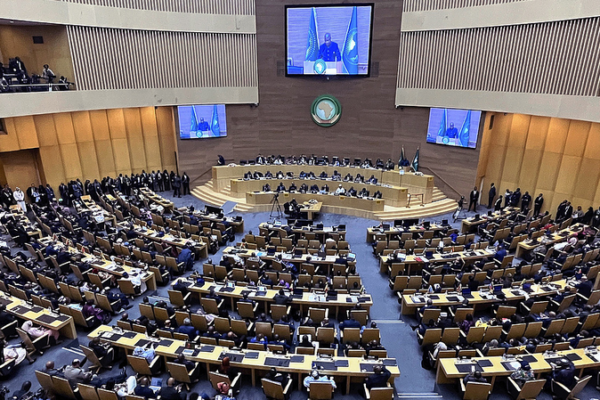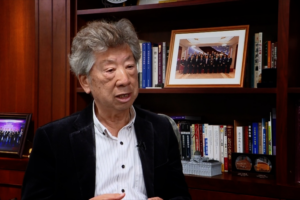
China’s 2026 Spring Festival Box Office Surpasses 1.1 Billion Yuan
China’s 2026 Spring Festival box office hits 1.1 billion yuan, driven by diverse film releases and a new government subsidy initiative to boost cinema attendance.

Nigeria, US Strengthen Military Ties with Capacity-Building Deployment
Nigeria launches joint military training program with 100 US personnel to enhance counter-terrorism capabilities and regional security infrastructure.

Kazakhstan’s Shaidorov Makes History with Olympic Gold, Aims to Inspire Youth
Kazakhstan’s Mikhail Shaidorov wins historic figure skating gold at Milano Cortina 2026, discusses Olympic journey and plans to develop winter sports in Central Asia.

Tarique Rahman Sworn In as Bangladesh Prime Minister After BNP Election Victory
Tarique Rahman becomes Bangladesh’s PM after BNP secures parliamentary majority in February 2026 elections, marking a major political shift following Sheikh Hasina’s 2024 resignation.

Iran’s Khamenei Vows Resilience Against U.S. Military Threats in 2026
Iran’s Supreme Leader Ali Khamenei asserts U.S. cannot destroy Iran amid ongoing nuclear talks and heightened military tensions in West Asia.

African Union Demands Full UN Membership for Palestine, Condemns Occupation
African Union leaders at the 39th Summit in Addis Ababa called for Palestine’s full UN membership and condemned Israeli occupation, citing humanitarian crises in Gaza.

Morocco Begins Post-Flood Recovery as Northwest Residents Return Home
Moroccan authorities facilitate residents’ return to flood-hit northwest regions, backed by a $330 million recovery plan and improved weather conditions.

Xinjiang Gala 2026 Bridges Cultures Along Silk Road
The 2026 Xinjiang International Spring Festival Gala showcases cultural unity and innovation, blending tradition with modern tech for a global audience.

Indonesia-China Ties Strengthened with Spring Festival Gala Mascot Exchange
Indonesian Ambassador to China receives CMG Spring Festival Gala mascot, highlighting cultural ties and the global impact of China’s Lunar New Year celebrations.

US-Iran Indirect Talks Resume in Geneva Amid Regional Tensions
Second round of US-Iran indirect negotiations begins in Geneva with Omani mediation, aiming to address regional tensions and nuclear concerns.
CGTN Presents Spring Festival Mascot to Jordan’s Envoy, Strengthening Cultural Ties
CGTN gifts Spring Festival Gala mascot to Jordan’s ambassador, highlighting cultural exchange and strengthened China-Jordan relations in 2026.

Jackie Chan’s ‘Panda Plan’ Debuts in Theaters, Captivates Global Audiences
Jackie Chan’s latest family comedy ‘Panda Plan: The Magical Tribe’ premieres in the Chinese mainland, blending action, humor, and cultural themes with a star-studded cast.

Iran and U.S. Resume Indirect Nuclear Talks in Geneva Amid Global Scrutiny
Second round of indirect Iran-U.S. nuclear negotiations commences in Geneva, with global observers closely monitoring progress toward regional stability.

U.S.-Iran Sanctions Stalemate: A Call for Renewed Diplomacy in 2026
As U.S. sanctions on Iran persist into 2026, experts urge renewed diplomacy to break the stalemate and address regional tensions.

Pipa Virtuoso Fang Jinlong Bridges Cultures in 2026 Spring Festival Gala Collaboration
Pipa virtuoso Fang Jinlong’s cross-cultural performance at the 2026 CMG Spring Festival Gala highlights global unity through music, featuring Jackie Chan and Lionel Richie.

Chongqing Hotpot: A Fiery Culinary Icon Defining Southwest China’s Mountain City
Discover Chongqing’s legendary hotpot, a fiery culinary icon blending rich spices, fresh meats, and vibrant local culture in southwest China.

Unveiling Lingnan’s Hidden Blessings at Chen Clan Academy
Discover the Chen Clan Academy, a Lingnan architectural gem in Guangzhou where intricate carvings embody blessings and prosperity. A cultural must-see in 2026.

Milano Cortina 2026: Nine Gold Medals Decided on February 17
Nine gold medals awarded on February 17 at Milano Cortina 2026 Winter Olympics, featuring snowboarding slopestyle finals and speed skating team pursuits.

Gu Ailing Soars to Big Air Silver in Stunning Winter Games Comeback
Chinese freestyle skier Gu Ailing claims silver in the women’s big air at the 2026 Winter Olympics, marking a triumphant return after a four-year hiatus from international competition.

Global Interest in Chinese New Year Surges as Cultural Resonance Expands, CGTN Poll Reveals
CGTN’s 2026 survey reveals surging global engagement with Chinese New Year traditions, with international travel bookings quadrupling and 95% expressing cultural curiosity.












